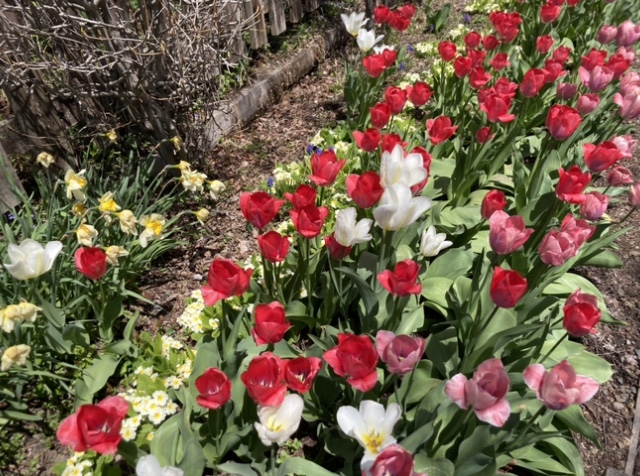The weather was said to be three parts cold and four parts warm today, but it turned out to be quite cold and windy when I went outside. Despite that, I took a 25-minute walk to the Delicia supermarket via the nearby 7-Eleven for exercise since I haven’t had a day off lately. I felt refreshed seeing the spring flowers blooming on the roadside, so I think it was a good exercise.
When I got home, I ran into Ms., an elderly woman who lives near my house, and we chatted for a while. She’s the person I’m closest to in Karuizawa. She moved here from Tokyo four years ago and was happy to tell me that a repairman was coming soon to do some maintenance on her house. She had consulted with me about this issue before, and at that time, I had told her that even if she didn’t move from her house, she would surely have a chance to solve the problem naturally. She smiled and said she was happy that it had finally happened.
I’ve learned from experience that if you have a problem, it may naturally disappear if you endure it for a few years. However, once one problem is solved, another problem may arise, and humans are able to maintain balance and feel secure by having at least one problem. When there are no problems at all, anxiety arises that “this happiness will be destroyed someday?” Lately, I try to be grateful when I have to endure a little bit and take it as a blessing.
After coming back home, I took a short break and bought a new book by Koichiro Kokubun from Amazon called “Resistance to Purpose – Series of Philosophy Lectures – (Shincho Shinsho)” on Kindle. This book is based on Mr. Kokubun’s lecture for high school students at the University of Tokyo that I listened to on YouTube before. I found the chapter on Boy Kim by Rudyard Kipling interesting, and I’d also like to read the children’s literature called “Boy Kim.” The rough source of that chapter was Arendt’s “The Origin of Totalitarianism,” and I plan to take out that book and read it again. Arendt’s books invite readers to various good books like this, and I truly admire her as a wonderful and respectable sociologist. Mr. Kokubun must have been influenced and inspired by Arendt.
This “Resistance to Purpose – Series of Philosophy Lectures” book is also closely related to the topic of “missing the mark” that I wrote about in my blog post yesterday. It says that having a purpose is important to increase motivation, but being bound by it can be inconvenient.
I believe that art attracts people with elements that are incomprehensible or inexplicable. I dream of realizing immeasurable paintings that surpass human understanding while striving to extend my potential further.
